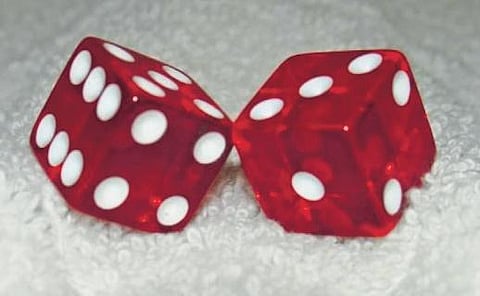

BENGALURU: When we talk of board games, it invariably leads to a conversation on dice. Dice of different types have been used from the most ancient times to generate random numbers and with that comes concepts of probability. Dice and the concept of probability have long been linked to gambling. The Gambler’s Lament in the Rig Veda is a poetic monologue by a gambler about the ruin brought on him because of addiction to dice. The verse below gives us some insights into his feelings.
“Play not with dice: no, cultivate thy corn-land. Enjoy the gain and deem that wealth sufficient. There are thy cattle there thy wife, O gambler.”
Despite the perils of gambling, playing dice was considered an important skill among kings and the ruling class. To quote C Rajagopalachari, “The Kshatriya tradition made it a matter of etiquette and honour not to refuse an invitation to a game of dice.”
In fact, during the Rajasuya ceremony, (the consecration of the king) towards the end of the rites, the enthronement of the king was accompanied by a dice game which was rigged so that the king would win. Traditionally-used dice were the nuts of Vibhitaka or Thandrikai (in Tamil). However, over centuries, India developed a robust dice tradition with numerous games played on a variety of boards as well as a wide variety of dice.
With such strong ritualistic links to dice and gambling, it is not surprising that wars were fought, kingdoms fell, and people were killed over a game of dice. From the epic Mahabharatha, which brought two sides of a family to the battlefield with bloodshed and misery, to the explosive story of Balarama killing Rukmi over a game of dice or the love story of Nala and Damayanti and the challenges they faced over a loss in a dice game, the stories are numerous.
While many identify the game of Chaupad (or Shokkattan or Dayakattam) as the game played traditionally in the epics, there is no real reference to it. What we see in sculptures and paintings are mere artistic renderings for there is little evidence as to what game was played. However, due to the grief that the game caused, it earned a reputation over time and many people would not play the game or play with dice fearing that it would bring friction to the family.
Tragically it meant the slow fading away of a game from memory and people’s lives. Interestingly, many who continued to play the game came up with a compromise. At the first throw of the dice, no move would be made a symbolic gesture, as a prayer to keep harmony among players. This wonderful dice game, a brilliant interplay of choice and chance slowly saw a resurgence as people came to understand that the game could not be blamed for human frailty.
More recently in the city of Fatehpur Sikri built by Emperor Akbar, located south of the Diwan-i-Khas is a large courtyard with visible markings of the game of Pachisi or Chaupad – the dice game played on a symmetric cross. The rather large dimensions of the playing area suggest that humans might have been used as playing pieces in the game.
While the stories about dice and the game range from the spectacular to the tragic, to me the most beautiful and delicate are from the Karpuracaritabhana of Vatsaraja describing a game of dice between Shiva and Parvati. Parvati says after losing a game:
I’ll pay up what I owe you,all the kisses you won at dice.
But what’s the rush?
You clever man, your eagerness is misplaced. Under our terms, I have a period of grace, a hundred days and nights.
That’s what she said, while Siva was already blinking his eyes the sun and moon and at every blink a day
was over.
So many emotions, so many stories, so much feeling in just… dice.
(The writers’ views are their own)